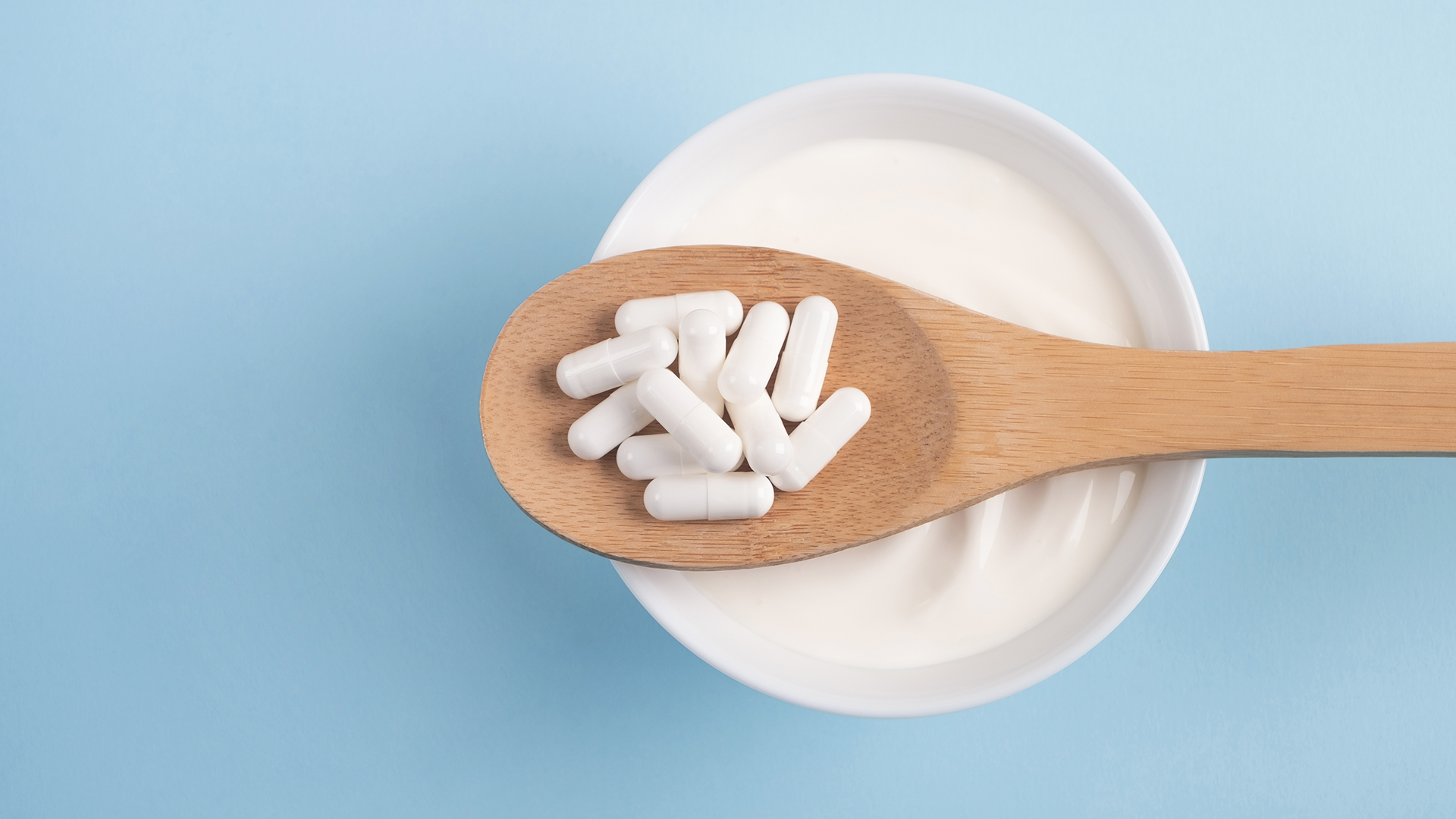Learn all about how the gut-brain axis deeply influences both our physical health and mental wellbeing right here.
Exploring the axis reveals a fascinating insight into how your gut health is connected to your physical and mental health.
This complex network is a true gateway to your total wellbeing and underscores the unsung role of the gut microbiota in our health. So, join us as we break down the crucial connection between your gut and brain.
We’ll learn all about gut to brain communication, this ‘axis’, the influence of gut bacteria on your nervous system, and how good digestive health can help you strike the perfect balance when it comes to brain function and physical ability.
Ready to learn how to have a happy gut and a healthy, confident glow, whatever your goals?
Let’s dive in…
Introducing the gut-brain axis

Wow.
The human body is an extraordinary machine where even our gut plays a pivotal role in supporting our mental wellness through the gut-brain axis.
Not many people know this, by the way. But it’s a huge biological truth.
So, what is this axis all about? Well, it refers to the complex network of neurons, hormones, and biochemical signals that link the gastrointestinal tract and the brain.
This axis is crucial for important bodily operations and for its substantial impact on mental health and emotional states.
It's through various channels, notably the vagus nerve—one of the most extensive nerves bridging the gut and brain directly—that this axis functions.
The vagus nerve acts like a calm and collected traffic controller; it helps to slow things down and promotes a state of peace or rest.
When your body goes into a state of "alert" due to stress, this vagus nerve sends out signals that it’s time to chill out and take a rest, working as your body's natural stress reliever.
The neurotransmitters and chemical messengers synthesized in the gut can shape brain functionality, revealing an in-depth psychobiological connection. This might explain the phenomenon we refer to as a "gut feeling."
Still with us? Okay!
At the heart of this system is the enteric nervous system, our body's "second brain," in tandem with the rich ecosystem of our gut microbiota.
Each aspect uncovers a segment of the bigger picture, shedding light on how our bodies navigate and control both internal and external pressures.
When looking at the relationship between our gut and our mental and physical wellness, it's obvious that there’s an intricate dynamic at play—all powered by the gut to brain transmission line. Pretty amazing stuff.
Okay, now let’s outline the main processes and interactions that show how this complex communication network operates.
Enteric nervous system (ENS)
The vagus nerve is like the main highway between your brain and your gut, where the gut microbes are like local inhabitants sending updates on your health.
This two-way street allows your brain to respond appropriately, managing digestion and influencing your mood.
The central role of the central nervous system (CNS)
At the heart of it all, the Central Nervous System (CNS), comprising the brain and spinal cord, plays a leading role.
It's like the command center, receiving and decoding signals from the gut. This exchange doesn't just influence digestion—it impacts your health overall—hammering home the interconnectedness of mind and body.
When communication falters: IBS & GI disorders
Conditions like Irritable Bowel Syndrome (IBS) spotlight what happens when the gut to brain conversation hits a snag.
The end result of discomfort and altered bowel movements is your body's way of saying the connection needs attention.
If you suffer from IBS, it may be time to explore dietary changes, stress reduction techniques, and possibly seek guidance from healthcare professionals.
The gut micobiota's role in our mental and physical health
As you now know, the gut microbiota, is a complex and dynamic community of microorganisms that plays a big-hitting role in both our mental and physical health.
Through the gut to brain axis, this intricate system communicates directly with the brain, influencing neurotransmitter levels and modulating the body's stress response.
Mental health

Now let’s look at the critical aspects of how our gut impacts mental wellbeing.
Mood disorders
Mood disorders such as depression and anxiety are profoundly affected by the gut flora through the production of neurotransmitters like serotonin, which is predominantly produced in the gut.
Imbalances in gut bacteria can lead to altered neurotransmitter levels, influencing mood, our brain health, and potentially contributing to these disorders.
Stress response
The axis plays a crucial role in the body's stress response.
Dysregulation of this axis can mean feeling stressed, leading to heightened stress response and worsening of mental health conditions like anxiety and post-traumatic stress disorder (PTSD). It’s a bit of a vicious cycle.
Brain function
Emerging research indicates that the gut flora can influence cognitive functions, including memory, learning, and decision-making processes. That means a healthy gut can mean better brain health.
Imbalances in gut bacteria might contribute to cognitive impairments, affecting daily functioning and quality of life.
Neurodegenerative diseases
The inflammation originating from gut issues can have profound effects on the brain, contributing to the development of neurodegenerative diseases like Alzheimer's disease and Parkinson's disease.
By understanding the impact of the gut flora on mental health and the human brain, it’s clear that maintaining a healthy gut through diet, lifestyle, and the right probiotic supplements is the way to go.
Physical health

Now let’s take a look at how your body is affected by gut flora.
Digestion & nutrient absorption
A balanced gut flora is essential for efficient digestion and optimal nutrient absorption, contributing to overall physical wellbeing and protection against gastrointestinal diseases.
Inflammation & immune system
The gut flora interacts with the immune system to reduce inflammation, providing defense against pathogens and playing a role in the prevention of chronic diseases like obesity, diabetes, and autoimmune disorders.
Through maintaining a vibrant gut ecosystem, we support the network central to our brain and emotional resilience.
The gut explained
The word ‘gut’ conjures up pretty unsavory images, doesn’t it? But once you think about it the YourBiology way, we think you’ll see its beauty.
Picture the gut as a massive metropolis, bustling with countless microorganisms.
These residents—collectively known as the gut microbiota or gut flora—go beyond digestion to level up health and wellbeing in a number of ways.
They're actually shaping your brain function and health, having a say in your mental states and cognitive abilities. It's like having billions of tiny friends helping you stay balanced.
This is all orchestrated by, you guessed it, the connecting axis between the gut and brain. It establishes a high-speed line of communication between our central nervous system and the gastrointestinal tract.
Still following? Okay!
The cross-talk through this axis involves neural pathways, hormones, and our immune system, allowing the human gut flora to impact mood regulation and stress management in pretty epic ways.
So what is science saying?
One study (there are loads of others too) found there are complex interactions between stress, depression, diet, and the gut flora, highlighting the huge role these factors play in psychoneuroimmunology (the connections between the mind psycho- the brain and nervous system neuro- and nutrition).
It emphasizes the bidirectional communication (two directions, both forwards and backwards) between the gut flora and the you. This is where stress and depression can influence dietary choices and, as a result, the composition of the gut flora.
See why we’re so passionate about a healthy gut?
The impact of dysbiosis (a.k.a. gut imbalance)
Dysbiosis is a very sciencey word isn’t it, so let’s decode it.
Dysbiosis refers to an imbalance in our gut's microbial community. It can have profound consequences on our health, when it comes to stress and anxiety.
Gut bacteria can balance the hypothalamic-pituitary-adrenal (HPA) axis, which controls stress responses. Dysbiosis may lead to an overactive HPA axis, resulting in heightened stress and anxiety.
This disrupted microbial equilibrium can alter the axis communication.
The result?
When these beneficial bacteria are outnumbered by harmful bacteria, serotonin production drops, potentially leading to increased anxiety, mood swings, and depression.
Our gut's health also affects how we handle stress. A balanced microbiome helps our body manage stress more effectively.
But, dysbiosis can disrupt this balance, making us more susceptible to stress and anxiety disorders. This disruption can create a feedback loop, where stress worsens dysbiosis, further impacting our mental health.
It’s clear, isn’t it, how important this fine bacterial balance is inside us and how the gut to brain connection tries to run things smoothly. But what can we do to balance it?
How to strike a better gut balance: Quick tips…
- Beat stress with yoga, meditation or opening up to a trusted person
- Limit processed and high-sugar foods to prevent harmful bacteria growing
- Get active as physical activity promotes the growth of beneficial gut bacteria
Diet and the gut

You probably know that your diet has a big impact on the types of bacteria that live in your gut and that eating gut-friendly foods will result in a happy gut microbiome.
So, it makes sense that changing what you eat could be a smart way to help balance your gut bacteria. This balance is important because it connects to your brain and can influence how you feel.
Feeding on gut-friendly foods, especially those rich in prebiotics and probiotics, can help maintain a happy and healthy gut microbiome.
So what are some examples?
Prebiotics
Prebiotics are dietary fibers that feed the good bacteria in your gut, helping them grow.
Here are some prebiotic-rich foods…
- Garlic adds flavor and gut-health benefits to a variety of dishes.
- Onions are versatile and can be eaten raw or cooked, adding a prebiotic boost to meals.
- Bananas provide a quick, easy snack with prebiotic benefits.
- Asparagus are great as a side dish, roasted or steamed, and full of prebiotics.
- Oats are a hearty breakfast option that nourishes your gut bacteria.
Read: What are Probiotics? A Beginner's Guide to Gut Health
Probiotics
Probiotics are live beneficial bacteria found in fermented foods. Including these in your diet can help increase the diversity and health of your gut microbiome.
Here are some probiotic-rich foods…
- Yogurt which is natural and unsweetened that has live cultures on the label.
- Kefir is a A fermented milk drink, similar to a drinkable yogurt, rich in probiotics.
- Sauerkraut is fermented cabbage that’s not only probiotic-rich but also contains vitamins C and K.
- Kimchi is a spicy Korean side dish made from fermented vegetables, providing a probiotic punch.
- Kombucha is fermented tea that has become a popular probiotic drink.
Adding a mix of prebiotic-rich and probiotic-packed foods into your daily meals can create a harmonious gut microbiome.
If your kitchen is lacking in these microbiome-nurturing foods, going for supplements can be an excellent alternative to ensure you're getting the 'biotic' boost your body needs.
Yet, the secret to a thriving gut doesn't stop with 'biotics' alone. A well-rounded diet including a bounty of fruits, verdant vegetables, fiber-filled whole grains, and lean proteins is vital for sustaining a health-boosting microbiome.
You can start by choosing fermented options and fibrous foods in your diet that act as prebiotics, paving the way for the growth of advantageous bacterial colonies.
A holistic approach to gut health

If you’re suffering with issues related to your gut, don’t worry. We’re going to look at simple ways you can enjoy life and feel confident with a happy gut.
We’ve mentioned balanced nutrition as a way to nurture the gut flora, but what else?
Drink more water
Drink water regularly to aid the digestive process and promote the balance of beneficial gut bacteria.
Beat stress
Stress management practices such as meditation, yoga, or deep-breathing exercises can improve the health of our gut by reducing the negative impact stress has on the gastrointestinal system.
Getting mindful with food
Being present and mindful while eating can enhance digestion and absorption of nutrients.
Get moving regularly
Physical activity stimulates the digestive system and improves gut motility, which can help with issues like constipation.
Sleep
Prioritize quality sleep as it can have a protective effect on the gut and help maintain the health of the gastrointestinal lining.
Better lifestyle habits
Adopt lifestyle habits that support a happy gut, avoiding smoking and excessive alcohol.
How YourBiology can bring your smile back

Yes, that’s right! We truly believe our solutions to happy guts can help alleviate all kinds of gut-related issues, so it’s smooth sailing from here on out.
What makes us different? Well, we’re designed exclusively for the female force. And our female force wants to live life and love life.
Our forward-thinking solution features a premium probiotic formula with diverse strains of good bacteria that deliver an incredible 20 billion CFUs of friendly flora, added vitamins. Oh and we’re vegan, so we don’t let intolerances or dietary issues get in the way of a happy gut.
It’s not just a gut feeling. Our solutions help you beat the bloat and streamline digestion, give you glowing skin, and help your immune system fight off the nasties. Oh, and you’ll be bursting with dopamine and serotonin.
Tackley your gut issues head-on today and try YourBiology. Flip the script and get that happy glow—the natural way.




